新目标人教版九年级英语(10—14单元)知识点总结
- 格式:docx
- 大小:53.96 KB
- 文档页数:11

中考资料新目标九年级英语全部单元知识点、短语及句型总结中考资料新目标九年级英语全部单元知识点、短语及句型总结Unit 1一、知识点1.Check in : 在旅馆的登记入住。
Check out: 在旅馆结账离开。
2.By: ①通过…..方式(途径)。
例:I learn English by listening to tapes.②在…..旁边。
例:by the window/the door③乘坐交通工具例:by bus/car④在……之前,到……为止。
例:by October在10月前⑤被例:English is spoken by many people.3.how与what的区别:how通常对方式或程度提问,意思有:怎么样如何,通常用来做状语、表语。
what通常对动作的发出者或接受者提问,意思为什么,通常做宾语,主语。
①How is your summer holiday?It’s OK.(how表示程度做表语)②How did yo u travel around the world?I travel byair.③What do you learn at school?I learn English, math and many other subjects.① What…think of…?How…like…?② What…do with…?How…deal with…?③ What…like about…? How…like…?④ What’s the weather like today? How’s the weather today?⑤ What to do? How to do it?e.g. What do you think of this book?=How do you like this book?I don’t know what I should do with the matter.=I don’t know how I should deal with it.What do you like about China?=How do you like China?I don’t know what to do next step?=I don’t know how to do it next step?㊣ What good / bad weather it is today!(weather 为不可数名词,其前不能加 a )㊣ What a fine / bad day it is today! (day为可数名词,其前要加 a )4. aloud, loud与loudly的用法: 三个词都与"大声"或"响亮"有关。
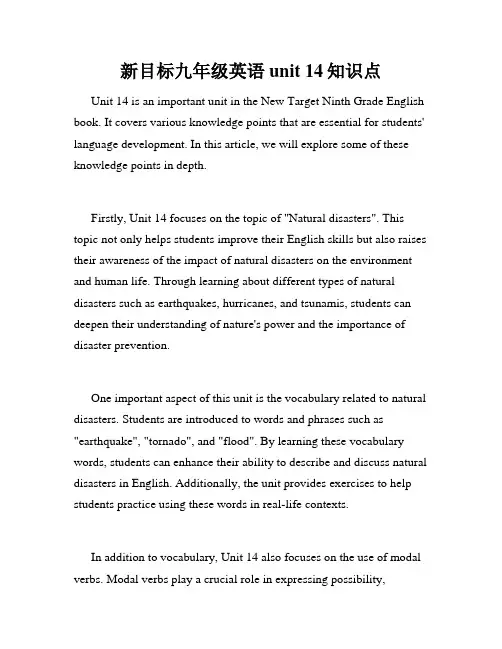
新目标九年级英语unit 14知识点Unit 14 is an important unit in the New Target Ninth Grade English book. It covers various knowledge points that are essential for students' language development. In this article, we will explore some of these knowledge points in depth.Firstly, Unit 14 focuses on the topic of "Natural disasters". This topic not only helps students improve their English skills but also raises their awareness of the impact of natural disasters on the environment and human life. Through learning about different types of natural disasters such as earthquakes, hurricanes, and tsunamis, students can deepen their understanding of nature's power and the importance of disaster prevention.One important aspect of this unit is the vocabulary related to natural disasters. Students are introduced to words and phrases such as "earthquake", "tornado", and "flood". By learning these vocabulary words, students can enhance their ability to describe and discuss natural disasters in English. Additionally, the unit provides exercises to help students practice using these words in real-life contexts.In addition to vocabulary, Unit 14 also focuses on the use of modal verbs. Modal verbs play a crucial role in expressing possibility,necessity, or obligation. In this unit, students are exposed to modal verbs like "can", "could", "must", and "might". By using these modal verbs correctly, students can express their own opinions and predictions about natural disasters. For example, they can say, "We must be prepared for earthquakes" or "Tsunamis can cause extensive damage".Furthermore, Unit 14 introduces the concept of passive voice. Passive voice is used to shift the focus from the subject of a sentence to the object. In the context of natural disasters, passive voice is commonly used to describe the damage caused by such events. For instance, students can learn to say, "Many houses were destroyed by the earthquake" or "The city was flooded by heavy rain". Understanding and using passive voice correctly can greatly improve students' writing and communication skills.Another important aspect of this unit is the reading passage on natural disasters. The reading passage provides students with valuable information about the causes and effects of natural disasters. By reading and analyzing the passage, students can broaden their knowledge and develop critical thinking skills. They can also learn useful reading strategies such as skimming and scanning to locate specific information.Moreover, Unit 14 includes grammar exercises to reinforce students' understanding of the content. These exercises involve structuring sentences, using appropriate verb tenses, and applying the knowledge learned throughout the unit. By completing these exercises, students can consolidate their understanding and improve their overall English proficiency.In conclusion, Unit 14 of the New Target Ninth Grade English book covers a range of knowledge points related to natural disasters. By learning vocabulary, modal verbs, passive voice, and reading passages, students can enhance their language skills and gain a better understanding of the impact of natural disasters. This unit provides a comprehensive and engaging learning experience, making English learning more enjoyable and relevant for students.。
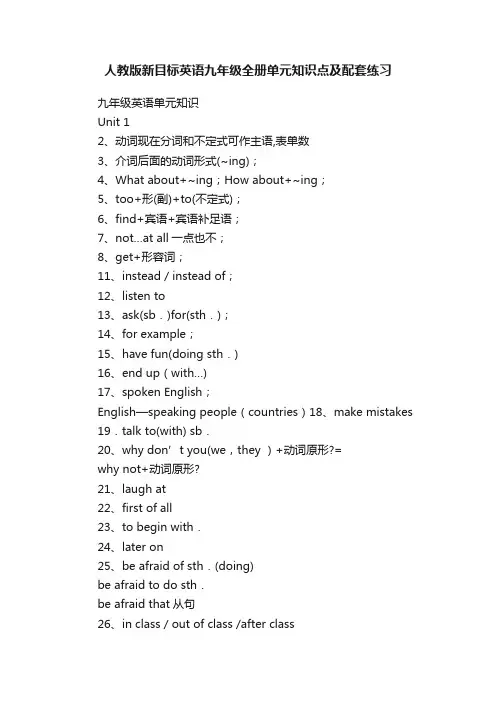
人教版新目标英语九年级全册单元知识点及配套练习九年级英语单元知识Unit 12、动词现在分词和不定式可作主语,表单数3、介词后面的动词形式(~ing);4、What about+~ing;How about+~ing;5、too+形(副)+to(不定式);6、find+宾语+宾语补足语;7、not…at all一点也不;8、get+形容词;11、instead/instead of;12、listen to13、ask(sb.)for(sth.);14、for example;15、have fun(doing sth.)16、end up(with…)17、spoken English;English—speaking people(countries)18、make mistakes 19.talk to(with) sb.20、why don’t you(we,they )+动词原形?=why not+动词原形?21、laugh at22、first of all23、to begin with.24、later on25、be afraid of sth.(doing)be afraid to do sth.be afraid that从句26、in class/out of class /after class27、take notes30、have trouble doing sth.31、look up32、make up a conversation.33、around the world.34、deal with35、stay(keep)+形容词36、go by37、decide(not)to do sth.40、complain about sth.41、compare sth to sth.(把…比作…);compare sth with sth.(把…与…进行比较)42、43、break off45、study for a test50、find sb./sth.+宾语补足语;find it +宾语补足语+(for sb.)to do sth.51、try one's best (to do sth.)52、with the help of sb=with one's help53、much tootoo muchUnit 21、过去常做某事:主语used to(不定式)be used to(介词)be used to(不定式)be used for sth.(doing)2、not…any more→no more;not…any longer→no longer5、复合词:a fifteen-year-old boy6、对某人而言做某事是…的:It's(形容词)for sb. to do sth.7、be able to do sth.8、give up(+ ~ing)9、afford sth.(to do sth.)10、be interested in sth.(doing.sth.)11、in front of…in the front of…12、be terrified ofbe afraid of13、go to bed(sleep)14、on the soccer team15、worry about sb.(sth.)be worried about…worry that从句16、all the time17、take a bus to(某地) = go to(某地)by bus 20、spend+time(money) on sth/(in)doing sth.)It takes(took)sb.+时间+to do sth.物cost(某人)+钱人 pay 钱 for 物。
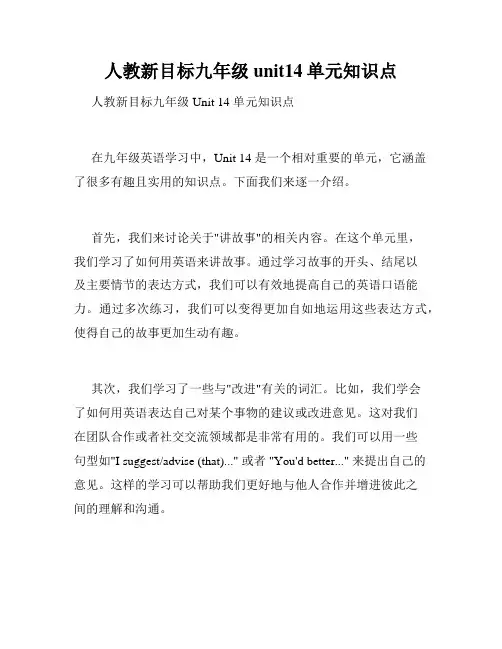
人教新目标九年级unit14单元知识点人教新目标九年级Unit 14 单元知识点在九年级英语学习中,Unit 14 是一个相对重要的单元,它涵盖了很多有趣且实用的知识点。
下面我们来逐一介绍。
首先,我们来讨论关于"讲故事"的相关内容。
在这个单元里,我们学习了如何用英语来讲故事。
通过学习故事的开头、结尾以及主要情节的表达方式,我们可以有效地提高自己的英语口语能力。
通过多次练习,我们可以变得更加自如地运用这些表达方式,使得自己的故事更加生动有趣。
其次,我们学习了一些与"改进"有关的词汇。
比如,我们学会了如何用英语表达自己对某个事物的建议或改进意见。
这对我们在团队合作或者社交交流领域都是非常有用的。
我们可以用一些句型如"I suggest/advise (that)..." 或者 "You'd better..." 来提出自己的意见。
这样的学习可以帮助我们更好地与他人合作并增进彼此之间的理解和沟通。
另外一个重要的主题是关于"文化差异"的学习。
在九年级英语课程中,我们不仅学习了一些国家、地区的文化知识,还学会了如何尊重和理解不同文化背景的人。
这对于我们建立开放的国际视野和培养跨文化交流的能力非常重要。
我们可以通过学习和了解不同文化背景的习俗、信仰或者历史事件,来更加广泛地认识世界各地的人和事物。
此外,本单元还包括对"职业规划"的一些简单介绍。
我们了解了一些常见的职业,并学习了如何用英语来表达自己的未来职业规划。
通过这样的学习,我们可以更好地了解各种不同职业的特点和要求,并为自己的未来进行合理的规划。
通过尝试不同的职业描述和对比,我们可以更准确地了解自己的兴趣和优势,进而选择适合自己的职业。
最后,我们学习了一些与"环保"有关的词汇和句型。
这一部分内容在当今社会中尤为重要。
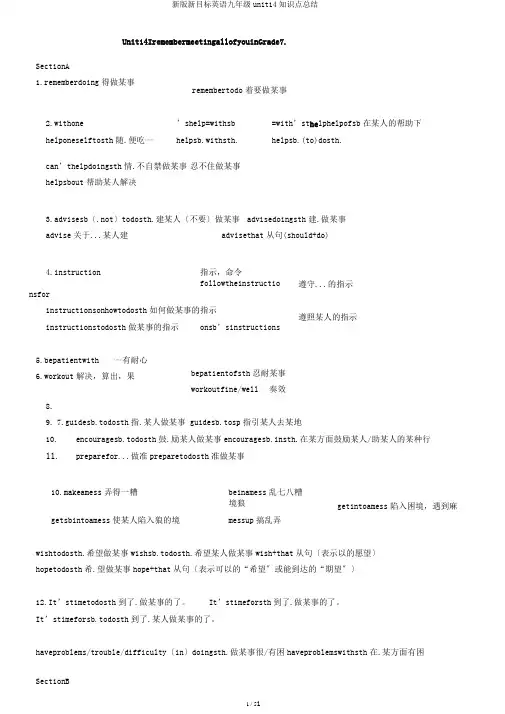
Unit14IremembermeetingallofyouinGrade7.SectionA1.rememberdoing得做某事remembertodo着要做某事2.withone ’shelp=withsb=with’st he lphelpofsb在某人的帮助下helponeselftosth随.便吃⋯⋯helpsb.withsth. helpsb.(to)dosth.can’thelpdoingsth情.不自禁做某事忍不住做某事helpsbout帮助某人解决3.advisesb〔.not〕todosth.建某人〔不要〕做某事advisedoingsth建.做某事advise关于...某人建advisethat从句(should+do)4.instruction 指示,命令followtheinstructio nsforinstructionsonhowtodosth如何做某事的指示instructionstodosth做某事的指示onsb’sinstructions 遵守...的指示遵照某人的指示5.bepatientwith ⋯⋯有耐心6.workout解决,算出,果bepatientofsth忍耐某事workoutfine/well 奏效8.9.7.guidesb.todosth指.某人做某事 guidesb.tosp指引某人去某地10.encouragesb.todosth鼓.励某人做某事encouragesb.insth.在某方面鼓励某人/助某人的某种行11.preparefor...做准preparetodosth准做某事10.makeamess弄得一糟beinamess乱七八糟境狼getsbintoamess使某人陷入狼的境messup搞乱弄getintoamess陷入困境,遇到麻wishtodosth.希望做某事wishsb.todosth.希望某人做某事wish+that从句〔表示以的愿望〕hopetodosth希.望做某事hope+that从句〔表示可以的“希望〞或能到达的“期望〞〕12.It’stimetodosth到了.做某事的了。
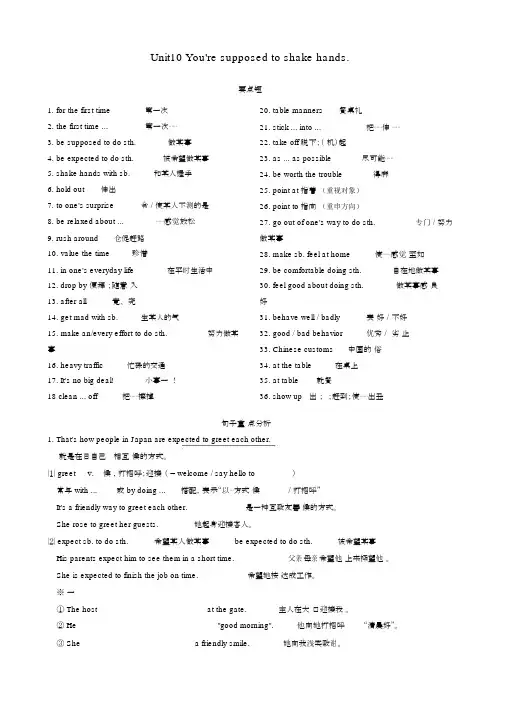
Unit10 You're supposed to shake hands.要点短1. for the first time第一次2. the first time ...第一次⋯⋯3. be supposed to do sth.做某事4. be expected to do sth.被希望做某事5. shake hands with sb.和某人握手6. hold out伸出7. to one's surprise令/使某人不测的是8. be relaxed about ...⋯⋯感觉放松9. rush around仓促赶路10. value the time珍惜11. in one's everyday life在平时生活中12.drop by便拜;随意入13. after all竟、究14. get mad with sb.生某人的气15. make an/every effort to do sth.努力做某事16. heavy traffic忙碌的交通17. It's no big deal!小事一!18 clean ... off把⋯⋯擦掉20. table manners餐桌礼21. stick ... into ...把⋯⋯伸⋯⋯22.take off脱下;(机)起23. as ... as possible尽可能⋯⋯24. be worth the trouble得麻25.point at指着(重视对象)26.point to指向(重申方向)27. go out of one's way to do sth.专门/努力做某事28. make sb. feel at home使⋯⋯感觉至如29. be comfortable doing sth.自在地做某事30. feel good about doing sth.做某事感良好31. behave well / badly表好/不好32. good / bad behavior优秀/劣止33. Chinese customs中国的俗34. at the table在桌上35. at table就餐36.show up 出;;赶到;使⋯⋯出丑句子重点分析1. That's how people in Japan are expected to greet each other.就是在日自己相互候的方式。
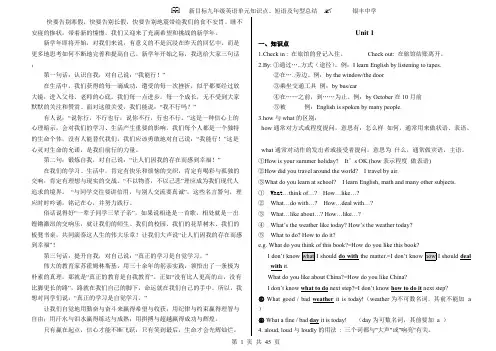
①aloud是副词,重点在出声能让人听见,但声音不一定很大,常用在读书或说话上。
通常放在动词之后。
aloud没有比较级形式。
如: He read the story aloud to his son.他朗读那篇故事给他儿子听。
②loud可作形容词或副词。
用作副词时,常与speak, talk, laugh等动词连用,多用于比较级,须放在动词之后。
如:She told us to speak a little louder. 她让我们说大声一点。
③loudly是副词,与loud同义,有时两者可替换使用,但往往含有令人讨厌或打扰别人的意思,可位于动词之前或之后。
如:He does not talk loudly or laugh loudly in public. 他不当众大声谈笑。
5. voice 指人的嗓音也指鸟鸣。
sound 指人可以听到的各种声音。
noise 指噪音、吵闹声6. find + 宾语+ 宾补(名词形容词介词短语分词等)例:I find him friendly. I found him working in the garden.We found him in bed. He found the window closed.We found her honest.7. 常见的系动词有:①是:am 、is、are②保持:keep、stay③转变:become、get、turn④……起来feel、look、smell、taste、sound8. get + 宾语+宾补(形容词过去分词动词不定式)使某种情况发生例:Get the shoes clean. 把鞋擦干净Get Mr. Green to come. 让格林先生进来I want to get my bike repaired. 我想去修自行车You can’t get him waiting. 你不能让他老等着9. 动词不定式做定语①与所修饰的名词构成主谓关系The next train to arrive was from New York. He is always the first to come.②与所修饰的名词构成动宾关系I have nothing to say. I need a pen to write with.I need some paper to write on. I don’t have a room to live in.10. practice , fun 做名词为不可数名词11. add 补充说又说12. join 加入某团体并成为其中一员attend 出席参加会议或讲座join in与take part in指参加到某项活动中去。
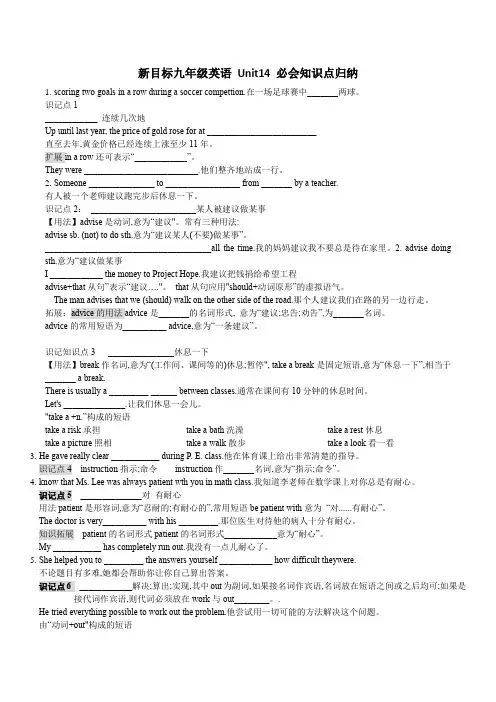
新目标九年级英语Unit14 必会知识点归纳1.scoring two goals in a row during a soccer compettion.在一场足球赛中_______两球。
识记点1____________ 连续几次地Up until last year, the price of gold rose for at _________________________直至去年,黄金价格已经连续上涨至少11年。
扩展in a row还可表示“____________”。
They were __________________________.他们整齐地站成一行。
2.Someone _______________ to _________________ from _______ by a teacher.有人被一个老师建议跑完步后休息一下。
识记点2:________________________某人被建议做某事【用法】advise是动词,意为“建议"。
常有三种用法:advise sb. (not) to do sth.意为“建议某人(不要)做某事”。
______________________________________all the time.我的妈妈建议我不要总是待在家里。
2. advise doing sth.意为“建议做某事I ____________ the money to Project Hope.我建议把钱捐给希望工程advise+that从句”表示“建议…."。
that从句应用"should+动词原形”的虚拟语气。
The man advises that we (should) walk on the other side of the road.那个人建议我们在路的另一边行走。
拓展:advice的用法advice是_______的名词形式, 意为“建议;忠告;劝告”,为_______名词。
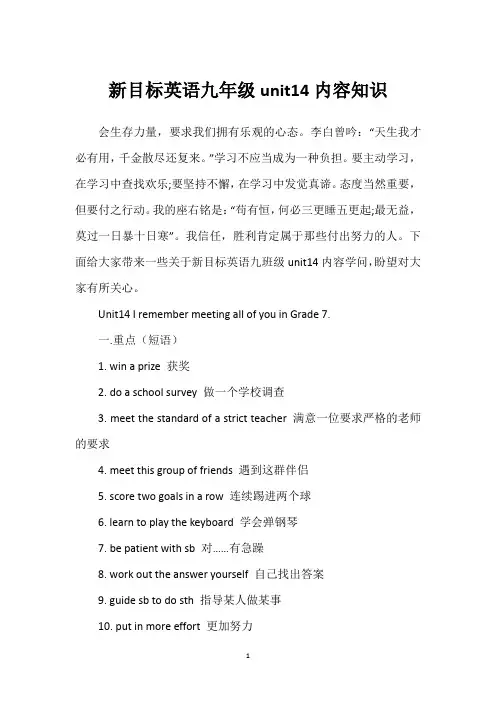
新目标英语九年级unit14内容知识会生存力量,要求我们拥有乐观的心态。
李白曾吟:“天生我才必有用,千金散尽还复来。
”学习不应当成为一种负担。
要主动学习,在学习中查找欢乐;要坚持不懈,在学习中发觉真谛。
态度当然重要,但要付之行动。
我的座右铭是:“苟有恒,何必三更睡五更起;最无益,莫过一日暴十日寒”。
我信任,胜利肯定属于那些付出努力的人。
下面给大家带来一些关于新目标英语九班级unit14内容学问,盼望对大家有所关心。
Unit14 I remember meeting all of you in Grade 7.一.重点(短语)1. win a prize 获奖2. do a school survey 做一个学校调查3. meet the standard of a strict teacher 满意一位要求严格的老师的要求4. meet this group of friends 遇到这群伴侣5. score two goals in a row 连续踢进两个球6. learn to play the keyboard 学会弹钢琴7. be patient with sb 对……有急躁8. work out the answer yourself 自己找出答案9. guide sb to do sth 指导某人做某事10. put in more effort 更加努力11. look back at 回首12. pride of overcoming fear 克服恐惊感的骄傲13. make a great big mess 弄得一团糟14. keep my cool 保持我的清高15. try to be on time for morning reading 尽力赶上早读16. look forward to doing sth 期望做某事17. join the school swim team 加入学校(游泳)队18. get a business degree 取得一个商业学位二.重点句型1. ---What happened in Grade7 that was special? 在七班级时发什么了什么特殊的事?---Our team won the school basketball competition. 我们队赢了学校的蓝球竞赛。
(Unit 10- Unit 14)汇总 1 Unit 10 You are supposed to shake hands. 一.重点词组 1. be supposed to do sth被期望/要求做某事;应该 2. shake hands 握手 3. drop by 顺便拜访 4. after all毕竟;终归 5. pick up 拾起;捡起 接某人 6. make a noise 发出噪音 7. table manners 餐桌礼仪 8. get used to 习惯于 9. be relaxed about对…随意/放松 10. get mad大动肝火;气愤 11.clean…off 把…擦掉 12.take off脱下(衣服);(飞机等)起飞 13.make an effort作出努力 14.make sb feel at home使某人感到宾至如归 15.cut up切开;切碎 16.be expected to do 被期待做… 17.make friends with与…交朋友 18.as soon as一…就… 19.to one’s surprise令某人吃惊的是 20. be different from 与…不同 21.on time 按时 in time及时 二.重点语法 1. (1)suppose:猜想;假设 suppose that表示“猜测;假设”,that可省 例:I suppose he is a student. (2)be supposed to do sth被期望做某事,应该做某事。相当于 should 和ought to 例:We are supposed to stop smoking. You are supposed to say hello to the foreigners. 【练习】You are supposed _____ hands when you meet for the first time. A. to shake B. shake C. shaking D. shook 2. make plans to do == plan to do. 打算做某事 例She has made plans to go to Beijing.=She has planed to go to Beijing. go out of one’s way to do 特意,专门做某事 例:He went out of his way to make me happy. 3. In Switzerland, it’s very important to be on time. 分析:it是形式主语,不定式是真正的主语。 例:To clean the blackboard is your job.=It’s your job to clean the blackboard. 4. We are the land of watches, after all. 毕竟我们是钟表王国。 (1)the land of watches钟表王国 例:China is the land of bikes. (2)after all毕竟 例:After all your brother is a little kid. 【练习】 Don’t be angry with her, _____ she is your mother. A. at first B. by the way C. after all D. in a word 5. Thanks for...=Thank you for...表示“因...而感谢”,后接名词、代词或者动名词作宾语 例:Thanks for helping me. Thanks for your message. 【练习】Thank you for _____ me to your birthday party. A. to ask B. asked C. invite D. Inviting 6. 辨析except和besides (1)except“除......之外”不包括所说的东西 例:I get up early except Sunday. (不包括星期天) Nobody was late for the meeting except me today. (2)besides的意思是“除了......之外,还有” 例:Five others are late besides me. (包含我在内) 7. not ...any more=no more 不再 not... any longer=no longer 不再 例:The boy didn’t cry any more/longer when he saw his mother. 【练习】Don’t try to fool us. We are not children _______ A. any longer B. any more C. after all D. A, B and C (Unit 10- Unit 14)汇总 2 8.辨析maybe和may be (1)maybe 副词:“大概、或许”,常用于句首表示不确定的猜测。 例:Maybe your father is at home. (2)may be 情态动词:may+动词原形be构成句子的谓语,情态动词may表示推测,译为:也许是、可能是”。 【练习】Look at that tall man. He ______ your new teacher. A. maybe B. really be C. to be D. may be Unit 11 Sad movies make me cry. 重点短语 1. for the first time 第一次 2. the first time ... 第一次……3. be supposed to do ... 应该做…… 4. be expected to do sth. 被期望做…… 5. shake hands with sb. 和……握手 6. hold out 伸出 7. to one's surprise 令……意外的是 8. be relaxed about ... 对……感到放松 9. rush around 匆忙赶路10. value the time 珍惜时间 11. in one's everyday life 在日常生活中 12. drop by 顺便拜访;随便进入13. after all 毕竟、终究14. get mad with sb. 生……的气 15. make an/every effort to do sth. 努力做……16. heavy traffic 繁忙的交通 17. It's no big deal! 小事一桩!18 clean ... off 把……擦掉19. be worth doing 值得做 20. table manners 餐桌礼仪 21. stick ... into ... 把……伸进…… 22. take off 脱下;(飞机)起飞 23. as ... as possible 尽可能…… 24. be worth the trouble 值得麻烦 25. point at 指着 26. point to 指向 27. go out of one's way to do sth. 特地/努力做…… 28. make sb. feel at home 使……感到宾至如归 29. be comfortable doing sth. 自在地做…… 30. feel good about doing sth. 做……感觉良好 31. behave well / badly 表现好/不好 32. good / bad behavior 良好/恶劣举止 33. Chinese customs 中国的习俗 34. at the table 在桌上 35. at table 就餐 36. show up 出现;显现;赶到;使……出丑 37. show off 炫耀;显摆 38. show ... around ... 带……参观…… 句子重难点解析 1. Yes, she was, and waiting for her drove me crazy. 是的,等她让我发疯了。 drive sb. + adj. 使某人怎样 (drive sb. crazy/mad 使某人发疯/发狂) He nearly drove Alice mad with his fussing. 他的小题大做简直快把爱丽丝逼疯了。 ① That thing almost __________________________ . 那件事几乎要使我发狂了。 ② You'll ____________________________ some day. 你总有一天会把妈妈急疯了的。 2. Then she won't feel left out. 那么她就不 会感到自己被人遗忘。 feel left out (感到)被忽略;被冷落 Mary talked to her so that she wouldn't feel left out. 玛丽和她交谈,以免让她觉得被冷落。 No one speaks to him, he always ___________________________. 他总是觉得被人冷落。 3. He slept badly and didn't feel like eating.他的睡眠很糟糕,他也不想吃东西。 feel like doing 想要做某事(=want to do = would like to do) I do not feel like dancing now. 我现在不想跳舞。 I don't ______________________ anything now. 我现在什么都不想吃。 =I don't ________________ anything now. = I ____________________ to eat anything now. 4. His face was always pale as chalk. 他总是面色苍白。 (as) pale as chalk (一种明喻修辞结构,意思是脸色“惨白;苍白”。) You looked as pale as chalk when you went into hospital. 你进医院时面色苍白。 You look ___________________ today. What's wrong? 今天你看着面色苍白,哪里不舒服? ★ 英语常用pale来描述人不健康的面色 “煞白;苍白;灰白”等。 5. One day, a doctor was called in to examine the king. 一天,医生被传唤去给国王检查身体。 call in 召来,叫来,找来 I think we should call in a specialist. 我想我们应当去请一位专家来。 ① He only waited two minutes before he ______________ . 他只等了两分钟就被叫了进去。 ② ____________ the doctor at once. 马上去请医生来。